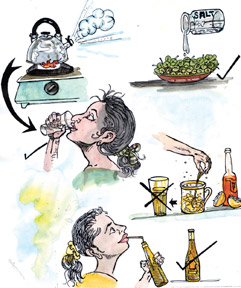|
Health Ministry warns:
Bowel diseases surge due to rains
By Carol Aloysius
The Health Ministry has warned the public that several bowel related
diseases could escalate in the wake of the heavy south west monsoon
showers, which may result in hospitalisation for many.
|

H. Tilekeratne |
"Diseases such as diarrhoea, hepatitis, typhoid and other bowel
related illnesses are common during such weather. The public must take
every precaution to avoid getting them", Assistant Director of the Food
Control Administration Unit of the Health Ministry, H. Tilekeratne told
The Sunday Observer. So what are the precautions? Can any member of the
public observer them?
In reply, the Health Ministry food expert shared some of his golden
rules with the Sunday Observer for preventing these diseases which could
undermine one's health.
Excerpts
 Rule No. 1:
Drink only boiled cooled water. Water boiled at the
correct temperature can kill germs. Avoid drinking water from Rule No. 1:
Drink only boiled cooled water. Water boiled at the
correct temperature can kill germs. Avoid drinking water from
un-protected wells or using water from them to wash dishes or
vegetables, as the water could have been polluted with overflowing
septic tanks", he said.
Rule No. 2: Avoid eating raw or lightly cooked leafy vegetables,
especially salads and malluns such as gotukola, kankun, mukunuwenna
during the rainy weather. "Leafy vegetables are grown on river banks.
The rivers overflow and the vegetables become contaminated with polluted
water", he said.
Q: Does that mean we have to deprive ourselves of these nutritious
leafy green veggies till the rains cease?
A: No. But before you eat these leafy greens or, any vegetable raw,
you must wash them first in clean water and then soak them in a strong
concentration of salt water which would kill the germs, before
consumption. This should be followed not only in rainy weather but
always, as they are grown often in polluted water and require a strong
dose of salt to kill the germs. In vegetables such as cabbage, remove
the outer leaves which are most exposed to contamination,", he said.
Q: What about fruit?
A: Never eat any fruit without washing and peeling them. Even when
plucked from trees, mangoes, jumbu or guava should be washed in clean
water and peeled before consuming. This should be practised both in the
rainy and non rainy weather, since they are constantly exposed to dust".
If you are one of those lucky householders to have garden space,
Tilekeratne's advice is to grow your own home garden. "What could be
better and safer than eating the fruits of your own garden which are
free from weedicides and pesticides?", he asked." Most of the farmers
today overuse pesticide and weedicide, so that all the fruits and
vegetables and even grains found in the open market are heavily laced
with harmful insecticides. The best alternative is to grow the
vegetables and fruits you normally consume in your own garden.
And use cow dung and compost manure made out of fallen leaves in your
garden to fertilize the plants, rather than artificial weedicides and
pesticides which can cause harm to the body.
Q: You said the fruits, vegetables and even grains found in the open
market and supermarkets contain excessive quantities of toxins used by
farmers who do not know how to regulate their use. Have any steps been
taken either by the Ministry of Health or the Ministry of Agriculture to
prevent this?
A: The Health Ministry is carrying out various awareness programmes
among farmers and the public. The Ministry of Agriculture is also taking
steps to formulate and introduce Good Agricultural Practices (GAP) for
the cultivation of food products.
Q: Apart from food contaminated with pesticides, there has been an
increasing number of reports about adulterated food being sold in the
open market. Is this true?
A: "Yes. Our food analysts have found that unscrupulous traders and
manufacturers now use papaw seeds in pepper packets, poonac in chillie
powder and textile dyes to colour turmeric and chillie powder.
Q: What is the Health Ministry doing to prevent the public from being
duped into buying these adulterated foods?
A: The only way you can beat them at their game is by making your own
homemade spices. They will taste better, and will definitely be safer
for the family. The Health Ministry has also developed a system to
detect adulteration in food with the help of Authorized Officers
appointed under the Food Act. But it is important for the public to
co-operate as well since the Ministry alone could not deal with the
problem, and inform the Food Unit whenever they come across any
adulterated foods being sold in the market.They must also check whether
the manufacturer is reliable and ensure that his address is on every
packet of spices sold.
Q: Do you have any other advice the public can follow?
A: It is very important to maintain personal hygiene by following
simple good habits such as washing hands before meals and after using
toilets.
I also wish to emphasise that one should avoid eating exposed food,
whether inside a restaurant or on the streets.
Rain or no rain, exposed food, including readymade drinks, get
contaminated easily and could lead to hepatitis and typhoid as well as
diarrhoea. Parents of schoolchildren must caution their children not to
buy ice palams or ice cream from carts or men selling them on cycles
which is prepared under unhygienic conditions. If they wish to buy ice
cream, they should go to a reputed restaurant where it is stored
hygienically. |


